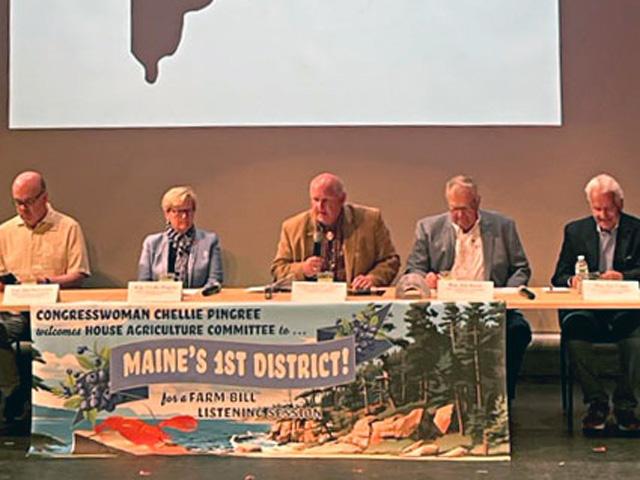Lining up House Farm Bill for Fall
House Ag Chair Talks About Scheduling for Farm Bill During Maine Trip
FREEPORT, Maine (DTN) -- House Agriculture Committee Chairman Glenn "GT" Thompson confirmed Monday he wants the House leadership to schedule floor time for the farm bill before he releases a draft of the bill or holds a markup.
Thompson, a Republican from Pennsylvania, made the statement in an interview with DTN on the sidelines of a farm bill listening session hosted by Rep. Chellie Pingree, D-Maine, in her district.
Thompson said he believes he will be ready to release the draft "at the end of August" and plans a markup "in mid-September," but only if leadership has told him what week the bill will be scheduled to come up on the House floor.
Thompson has previously said he plans to spend most of August in Washington working on the farm bill.
Farmers all over the country have said reference prices need to be raised because they are out of sync with current market prices, Thompson said. But raising reference prices requires more money, which he said in Washington amounts to "lifting rocks."
The Congressional Budget Office has "committed" to "reallocating analysts" to work on the farm bill, Thompson noted. CBO has sent the House Agriculture Committee an analysis of the cost of raising reference prices that trigger commodity payments, he said, but declined to discuss the details of the score.
Thompson will travel to Minnesota for a farm bill listening session at Farmfest in Morgan, Minnesota, on Wednesday, and also plans a farm bill event in Maryland.
AQUACULTURE AND FORESTRY
Most of the Maine residents who spoke at the listening session talked about issues that come up frequently at hearings and listening sessions including climate change research, crop insurance, dairy prices, hunger, and nutrition programs.
Thompson said he was impressed by the discussions he had heard about aquaculture and forestry during the two days he spent touring parts of Maine with Pingree. He added learning more about aquaculture and forestry "showed the value" of traveling around the country for listening sessions.
P[L1] D[0x0] M[300x250] OOP[F] ADUNIT[] T[]
During the listening session, Sebastian Belle, executive director of the Maine Aquaculture Association and president of the board of the National Aquaculture Association, said the House Agriculture Committee should tell the Agriculture Department to "prioritize" work on aquaculture. The United States, Belle noted, imports a lot of seafood.
Belle also said USDA should finalize organic standards in aquaculture, adding they have been under discussion for 20 years.
At the present time, Belle said, other countries can certify their seafood is organic and sell it as organic in the United States in competition with U.S. seafood.
Rep. Jim Costa, D-Calif., asked if the organic seafood from other countries is "legitimately organic," and Belle said it "varies," but the standards proposed in the United States would be "the strictest in the world."
Belle said the proposed standards have been approved by the National Organic Standards Board but have languished at the Office of Management and Budget for many years.
"Your suggestions make a lot of sense," Costa said.
One speaker also said industries adjacent to fishing need access to Farm Credit System loans, an issue that Pingree has addressed in a bill. She and Rep. Clay Higgins, R-La., have introduced a bill that would allow Farm Credit to provide loans to the fishing industry. Companion legislation has been introduced in the Senate by Sens. Angus King, I-Maine, and Lisa Murkowski, R-Alaska.
Several Mainers spoke at the listening session about the importance of innovations in the forestry industry.
Earlier in the day in a session at Wolfe's Neck Center for Agriculture & Environment, Thompson was told about Timber HP, a Maine company that makes insulation material from wood fiber.
PFAS IN THE FARM BILL
At a news conference, a reporter asked Thompson whether the per- and polyfluoroalkyl substances (PFAS) contamination, which has made products from some Maine farms unsaleable, is threatening the food supply.
Thompson said he does not think PFAS, also known as forever chemicals, will be a danger in the future because the danger of it is known. Municipal sewage sludge was spread on farmland in Maine and other states as fertilizer before experts realized the sludge contained PFAS.
Pingree said at the news conference there are many dangers to the world food supply.
PUERTO RICO
Thompson also said he will travel to Puerto Rico "just before Labor Day" to investigate Puerto Rico's management of its Nutrition Assistance Program (NAP) and its interest in joining the regular Supplemental Nutrition Assistance Program (SNAP).
Puerto Rico does not participate in the regular SNAP program, but instead gets a capped amount of money to distribute. The government of Puerto Rico, the American Farm Bureau Federation, the Biden administration and Sen. Kirsten Gillibrand, D-N.Y., have all said Congress should include Puerto Rico in the regular SNAP program, but Agriculture Secretary Tom Vilsack has said Puerto Rico needs to be able to manage the SNAP program like the states do and USDA is attempting to help Puerto Rico develop that expertise.
Including Puerto Rico in the regular SNAP is expected to cost a lot more than the current program for the island territory.
Also see, "Corn Growers Push for Mandatory Base Acre Update for Safety Net,"
Jerry Hagstrom can be reached at jhagstrom@nationaljournal.com
Follow him on Twitter @hagstromreport
(c) Copyright 2023 DTN, LLC. All rights reserved.




